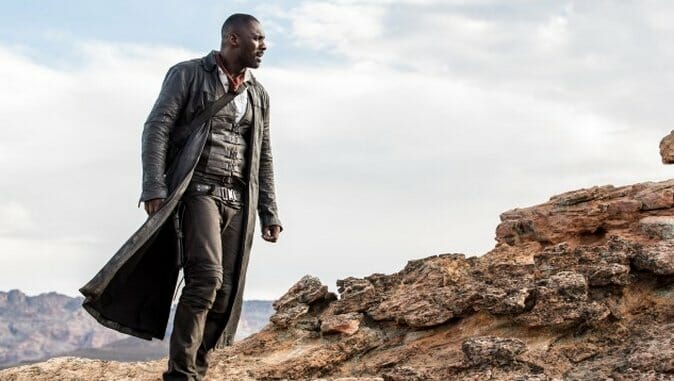The Dark Tower

Since the moment I walked out of The Dark Tower last night, I’ve been struggling with the perfect one-sentence review. At first, I was using “It’s like if you handed a one-page synopsis of the entire seven-novel series to a middle-schooler and told them to make a movie,” but that’s more hyperbole than it is reality. It’s actually far closer to the following: It’s like if you handed a one-page synopsis of the entire seven-novel series to a Hollywood screenwriter and told HIM to make a movie.
The Dark Tower is a trainwreck (a Blaine-wreck?) of a film, but a fascinatingly slight one at the same time. It’s so devoid of content and meaning that it’s easy to watch in spite of its terribleness—blink and it’s already over, and you’re walking out to your car, thinking, “They thought that was going to launch a huge multimedia franchise?”
The works of Stephen King have been subject to an incredible number of bad adaptations over the years. There are the ones that are objectively terrible, like Maximum Overdrive, King’s own directorial effort, in which the author was so strung-out on cocaine that he scarcely remembers doing any of it. There are the low-budget entries that are content to simply deliver cheap, tawdry thrills, such as Graveyard Shift or The Night Flier. And there are of course the handful of critically acclaimed masterpieces, but even in the case of Kubrick’s The Shining, the author still famously hates the finished product for deviating in key ways from the themes of his source material.
Which is all to say, if Kubrick’s The Shining isn’t good enough for Stephen King, then for the love of horror fiction, please let him never be forced to watch The Dark Tower. If you’re a friend or family member of Stephen King, I’m speaking directly to you right now: Don’t let him see this movie. It will destroy him to see the characters he labored over for 30 years be reduced to this level of bland insignificance.
The degree of condensation and simplification of the source material here is astounding. I haven’t read the entire Dark Tower series (I’m about halfway through), but it’s not accurate to say that you “need to have read the books” in order to understand the film. If anything, being armed with the knowledge of the books’ events only makes the film more confusing because its deviations are so inexplicable. Little moments from multiple books are cobbled together in a schizophrenic tapestry, demolishing the significance of any of them in the process. Everything you need to know, you can derive from the 90-minute runtime, in a film begging to be considered as “epic fantasy” while utterly desperate to get to the end credits as quickly as possible. Imagine if Peter Jackson decided that in order to tell the story of The Lord of the Rings, he would cram the entire thing into one film and cut the fellowship from nine characters to just Frodo and Gandalf, and that’s The Dark Tower.